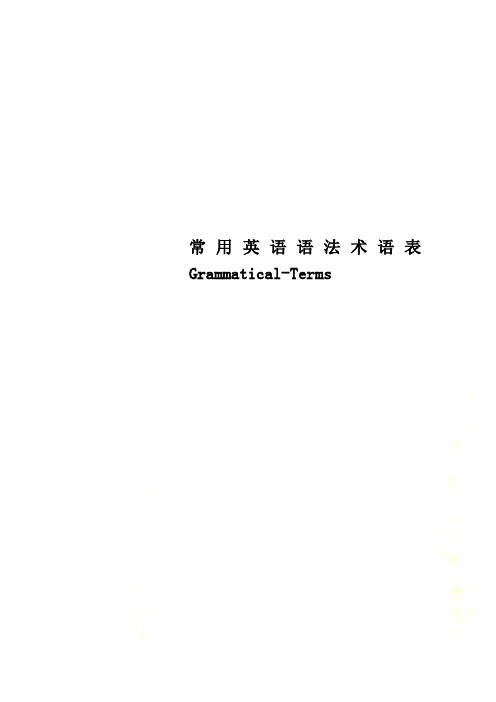infinite不定式
- 格式:doc
- 大小:55.50 KB
- 文档页数:6

不定式的句子成分功能
不定式(Infinitive)是一种非限定动词形式,由“to+动词原形”构成。
它在句子中可以充当多种成分,包括主语、宾语、表语、定语、状语和补足语等。
以下是不定式的句子成分功能的具体介绍:
主语:不定式可以充当句子的主语,表示一种行为或状态。
例如:To learn English is important.(学习英语很重要。
)
宾语:不定式可以充当动词的宾语,表示行为的对象。
例如:I want to go to the park.(我想去公园。
)
表语:不定式可以充当系动词的表语,表示主语的性质、特征或状态。
例如:My dream is to become a doctor.(我的梦想是成为一名医生。
)
定语:不定式可以充当名词或代词的定语,修饰它们所代表的人或物。
例如:I have a lot of work to do.(我有很多工作要做。
)
状语:不定式可以充当句子的状语,表示时间、原因、目的、结果等。
例如:He came here to see me.(他来这里看我。
)
补足语:不定式可以充当动词的补足语,补充说明宾语的行为或状态。
例如:She asked me to help her.(她让我帮助她。
)。


常用英语语法术语表Grammatical-Terms常用英语语法术语表Grammatical Terms 1. 语法grammar句法syntax词法morphology结构structure句子sentence从句clause词组phrase词类part of speech实词notional word虚词structural word单纯词simple word派生词derivative复合词compound词性part of speech名词noun专有名词proper noun普通名词common noun可数名词countable noun不可数名词uncountable noun抽象名词abstract noun具体名词concret noun物质名词material noun集体名词collective noun个体名词individual noun介词preposition连词conjunction动词verb主动词main verb及物动词transitive verb不及物动词intransitive verb 系动词link verb助动词auxiliary verb情态动词modal verb规则动词regular verb不规则动词irregular verb 短语动词phrasal verb限定动词finite verb非限定动词infinite verb使役动词causative verb感官动词verb of senses动态动词event verb静态动词state verb感叹词exclamation形容词adjective副词adverb方式副词adverb of manner程度副词adverb of degree时间副词adverb of time地点副词adverb of place修饰性副词adjunct连接性副词conjunct疑问副词interogative adverb关系副词relative adverb代词pronoun人称代词personal pronoun物主代词possesive pronoun反身代词reflexive pronoun相互代词reciprocal pronoun指示代词demonstrative pronoun疑问代词interrogative pronoun关系代词relative pronoun不定代词indefinite pronoun物主代词possecive pronoun名词性物主代词nominal possesive prnoun形容词性物主代词adjectival possesive pronoun冠词article定冠词definite article不定冠词indefinite article数词numeral基数词cardinal numeral序数词ordinal numeral分数词fractional numeral形式form单数形式singular form复数形式plural form限定动词finite verb form非限定动词non-finite verb form 原形base form2.morphology词法notional实词form word虚词word-building构词法root词根prefix前缀suffix后缀synonym同义词antonym反义词conversion转化法derivation派生法affixation词缀法composition合成法compound复合词parts of speech词类noun名词pronoun代词numeral数词adjective形容词verb动词adverb副词article冠词preposition介词conjunction连词interjection感叹词particle引导词classification of nouns名词的分类common noun普通名词proper noun专有名词collective noun集合名词material noun物质名词abstract noun抽象名词countable noun可数名词personal pronoun人称代词possessive pronoun物主代词reflexive pronoun反身代词demonstrative pronoun指示代词interrogative pronoun疑问代词relative pronoun关系代词indefinite pronoun不定代词reciprocal pronoun相互代词case格nominative case主格objective case宾格possessive case所有格singular form单数形式plural form复数形式cardinal numeral基数词ordinal numeral序数词fraction numeral分数数词degrees of comparison比较级positive degree原级comparative degree比较级superlative degree最高级notional verb实义动词modal verb情态动词link verb连系动词auxiliary verb助动词transitive verb及物动词intransitive verb不及物动词regular verb规则动词irregular verb不规则动词finite verb限定动词non-finite verb非限定动词person人称number数gender性tense时态voice语态mood语气principal forms of verbs动词的主要形式present form现在形式past form过去形式participle分词present participle现在分词past participle过去分词infinitive不定式gerund动名词verbal noun动名词simple present tense一般现在时simple past tense一般过去时simple future tense一般将来时present continuous tense现在进行时past continuous tense过去进行时future continuous tense将来进行时past perfect tense过去完成时future perfect tense将来完成时present perfect continuous tense现在完成进行时future perfect continuous tense将来完成进行时sequence of tenses时态的呼应passive voice被动语态active voice主动语态indicative mood陈述语气imperative mood祈使语气subjunctive mood虚拟语气adverb of time 时间副词adverb of place地点副词adverb of manner方式副词adverb of degree程度副词adverb of frequency频度副词conjunctive adverb连接副词definite article定冠词indefinite article不定冠词coordinating conjunction并列连词subordinating conjunction从属连词syntax句法declarative sentence陈述句imperative sentence祈使句exclamatory sentence感叹句interrogative sentence疑问句general question一般疑问句special question特殊疑问句alternative question选择疑问句disjunctive question反意疑问句simple sentence简单句compound sentence并列句语法术语Grammar Terms 语法grammar句法syntax词法morphology结构structure句子sentence从句clause词组phrase词类part of speech实词notional word虚词structural word名词noun专有名词proper noun普通名词common noun可数名词countable noun不可数名词uncountable noun 抽象名词abstract noun具体名词concrete noun物质名词material noun集体名词collective noun个体名词individual noun介词preposition连词conjunction动词verb主动词main verb及物动词transitive verb不及物动词intransitive verb 系动词link verb助动词auxiliary verb情态动词modal verb规则动词regular verb不规则动词irregular verb短语动词phrasal verb限定动词finite verb非限定动词infinite verb使役动词causative verb感官动词verb of senses动态动词event verb静态动词state verb感叹词exclamation形容词adjective副词adverb方式副词adverb of manner程度副词adverb of degree时间副词adverb of time地点副词adverb of place修饰性副词adjunct连接性副词conjunct疑问副词interrogative adverb 关系副词relative adverb代词pronoun人称代词personal pronoun物主代词possessive pronoun 反身代词reflexive pronoun相互代词reciprocal pronoun指示代词demonstrative pronoun疑问代词interrogative pronoun关系代词relative pronoun不定代词indefinite pronoun名词性物主代词nominal possessive pronoun形容词性物主代词adjectival possessive pronoun冠词article定冠词definite article不定冠词indefinite article数词numeral基数词cardinal numeral序数词ordinal numeral分数词fractional numeral形式form单数形式singular form复数形式plural form限定动词finite verb form非限定动词non-finite verb form原形base form从句clause从属句subordinate clause并列句coordinate clause名词从句nominal clause定语从句attributive clause状语从句adverbial clause宾语从句object clause主语从句subject clause同位语从句appositive clause时间状语从句adverbial clause of time地点状语从句adverbial clause of place方式状语从句adverbial clause of manner让步状语从句adverbial clause of concession原因状语从句adverbial clause of cause结果状语从句adverbial clause of result目的状语从句adverbial clause of purpose条件状语从句adverbial clause of condition真实条件状语从句adverbial clause of real condition非真实条件状语从句adverbial clause of unreal condition 含蓄条件句adverbial clause of implied condition错综条件句adverbial clause of mixed condition句子sentence简单句simple sentence并列句compound sentence复合句complex sentence并列复合句compound complex sentence 陈述句declarative sentence疑问句interrogative sentence一般疑问句general question特殊疑问句special question选择疑问句alternative question附加疑问句tag question反义疑问句disjunctive question修辞疑问句rhetorical question感叹疑问句exclamatory question存在句existential sentence肯定句positive sentence否定句negative sentence祈使句imperative sentence省略句elliptical sentence感叹句exclamatory sentence基本句型basic sentence pattern句子成分members of sentences主语subject谓语predicate宾语object双宾语dual object直接宾语direct object间接宾语indirect object复合宾语complex object同源宾语cognate object补语complement主补subject complement宾补object complement表语predicative定语attribute同位语appositive状语adverbial句法关系syntactic relationship 并列coordinate从属subordination修饰modification前置修饰pre-modification后置修饰post-modification限制restriction双重限制double-restriction非限制non-restriction数number单数形式singular form复数形式plural form规则形式regular form不规则形式irregular form格case普通格common case所有格possessive case主格nominative case宾格objective case性gender阳性masculine阴性feminine通性common中性neuter人称person第一人称first person第二人称second person第三人称third person时态tense过去将来时past future tense过去将来进行时past future continuous tense过去将来完成时past future perfect tense一般现在时present simple tense一般过去时past simple tense一般将来时future simple tense现在完成时past perfect tense过去完成时present perfect tense将来完成时future perfect tense现在进行时present continuous tense过去进行时past continuous tense将来进行时future continuous tense过去将来进行时past future continuous tense现在完成进行时present perfect continuous tense 过去完成进行时past perfect continuous tense语态voice主动语态active voice被动语态passive voice语气mood陈述语气indicative mood祈使语气imperative mood虚拟语气subjunctive mood否定negation否定范围scope of negation全部否定full negation局部否定partial negation转移否定shift of negation语序order自然语序natural order倒装语序inversion全部倒装full inversion部分倒装partial inversion直接引语direct speech间接引语indirect speech自由直接引语free direct speech自由间接引语free indirect speech一致agreement主谓一致subject-predicate agreement 语法一致grammatical agreement概念一致notional agreement就近原则principle of proximity强调emphasis重复repetition语音pronunciation语调tone升调rising tone降调falling tone降升调falling-rising tone文体style正式文体formal非正式文体informal口语spoken/oral English感情色彩emotional coloring 褒义commendatory贬义derogatory幽默humorous讽刺sarcastic挖苦ironic。


infinitive翻译成中文
infinitive翻译成中文:不定词, 不定词的。
infinitive
[英][ɪnˈfɪnətɪv][美][ɪnˈfɪnɪtɪv]
n.(动词)不定式;
adj.不定式的;
复数:infinitives
动词不定式(infinitive):在语法中,动词不定式是指动词的一种不带词形变化从而不指示人称、数量、时态的形式。
它之所以被叫做不定式,是因为动词不被限定,或者说不被词形变化所局限。
不定式属于非谓语动词。
在外语学习的课程中,动词不定式的一般现在时被称作“词典用词”,因为它一般被用作词典中该动词的词头。
对于英语来说接不定式的单词多为“打算”“计划”“希望”等表示未来的动词。
同样与不定时表示不同的动词不定式表示正在进行,一般性或经常发生性的行为。
动词不定式可以作以上各种成分,但它毕竟是动词,所以有动词的属性。
动词不定式及其短语还可以有自己的宾语、状语,虽然动词不定式在语法上没有表面上的直接主语,但它表达的意义是动作,这一动作一定由使动者发出。
这一使动者称之为逻辑主语。

英语语法知识难点---非谓语动词之不定式前言:不定式是什么?为什么会有不定式?不定式的英文称谓是infinitive,意思是“无限的”、“无穷的”、“极大地”等。
在维基百科中的释义是:Infinitive is a grammatical term used to refer to certain verb forms that exist in many languages.这是个源于拉丁语的词汇。
不定式之所以被称为不定式,是因为不定式的动词是很少受限定的,或者说不定式是不受词形变化的影响。
既然有了“不限定的”表达形式,肯定有相对应的“限定的”表达形式,那我们就叫它“动词限定式”表达吧,可是英语中没有这样的表达啊。
其实,英语的“限定式”表达就是那些有固定态势的时态、语态、人称、单复数和主谓一致等语法信息。
既然是不定式,就意味着其变化多端、身份特殊啊,可以担任除谓语动词外的所有成分,也就是说,作为动词的一种表达形式,它只说明的是动作本身而已,不含有动作发生的时态,即其本身无时态变化。
但是它却有几个能表达动作先后顺序的型态。
如下图所示:英语时态与语态对比表一,不定式的语法结构英语语法中的不定式,有带to的和不带to的两种形式。
其表示的是一种动作或状态,所以,就有一般式、进行时和完成时三种时态及主动态和被动态两种语态形式。
不定式的否定形式,则是在其前面加上表示否定意义的not。
二,不定式的时态与语态英语时态与语态对比表不定式的一般式表示的动作与谓语动词的动作无时间上的先后顺序;不定时的完成式表示的动作一般发生在谓语动词前,强调动作的先后顺序;不定式的进行时表示的动作一般与谓语动词同时进行。
例句:I hope to finish reading the noval today. 我希望今天读完这本小说。
You seem to have travelled many times. 你好像旅行过很多次了。
动词不定式用法讲解1、构成及特征2、动词不定式(infinitive)是动词的一种非限定形式,即非谓语动词形式,它有两种形式:一种是“to+动词原形”构成(to-infinitive);另一种是不带to的不定式,即动词原形(bare-infinitive)。
所有行为动词都有不定式形式,其否定式是在不定式前加not。
动词不定式(或不定式短语)没有人称和数的变化,在句子中不能作谓语。
动词不定式仍保留有动词的特点:3、(1)可以有时式和语态的变化,也可以有自己的宾语或状语,它们一起构成了不定式短语。
4、Hetriedtoworkouttheprobleminfiveminutes.他试图在五分钟之内算出这道题。
(带宾语和状语)5、Thefactorytobebuiltherenextyearisacarfactory.明年在这里建的工厂是一家汽车制造厂。
(有语态的变化)6、(2)动词不定式还具有名词、形容词和副词的特征,在句中可以作主语、宾语、表语、补语、定语、状语等成分。
7、HewantstostudyEnglish.他想学英语。
(tostudyEnglish在句中作want的宾语,而tostudy又有自己的宾语English,tostudy和English一起构成了不定式短语。
)8、Nevertooffendanyoneishisprinciple.不得罪人是他的原则。
(不定式作主语)9、注意:不定式在许多场合具有情态意义。
作主语时,相当于一个带有情态动词的主语从句;作宾语时,相当于一个带有情态动词的宾语从句;作定语时,相当于一个带有情态动词的定语从句;作目的状语时,相当于sothat或inorderthat引导的目的状语从句。
10、Itisrightforhertosayso.(=Itisrightthatsheshouldsayso.)她这样说是对的。
11、Hehasalotofworktodo.(=…thatheshoulddo)他有很多工作要做。
非谓语动词一、概念非谓语动词指不能单独做谓语,但同时仍保留动词的某些特征的动词形式。
非谓语动词主要有不定式、动词的-ing形式、动词的-ed形式三类。
它们没有人称和数的变化,但可以有自己的宾语、状语等。
二、真正领悟非谓语动词的用法要具备以下基础知识:1.具有句子结构的知识,要分得清简单句与复合句,陈述句与祈使句。
2.具有简单句最基本的五种句型的知识,要分得清双宾语和复合宾语。
3.具有扎实而丰富的动词知识,要分得清及物动词和不及物动词,双宾动词和复宾动词。
一些最基础最常用的动词的用法应当烂熟于胸。
4.具备各种复合句的知识,能够拆析30词左右长度的复合长、难句。
三、解题思路:1.、解析句子结构,确定设空在句子中充当的功能(如状语、定语或宾补)。
2.、找准相关动词的逻辑主语,确定该动词与逻辑主语是什么关系(主动还是被动)。
3.、搜索句子中相关的时间信息,确定非谓语动词的恰当形式。
4.、将该选项置入空中,看能否做到字从意顺,或传达有效信息、完成交际任务。
(一) 动词不定式动词不定式是指在句中不能独立做谓语的动词形式,在句子起名词、形容词或副词作用的成分。
不定式有两种形式,一种是带有不定式符号to的不定式,一种是不带不定式符号to的不定式,后者又称动词原形。
一、不定式的特征1.及物动词的不定式可以跟宾语。
I like to read detective stories.2.可以被状语修饰。
He asked me to say my name aloud.3.没有人称和数的变化。
She likes to play the piano.She liked to play the piano when she was young.4.否定形式在不定式符号to前加not. The teacher has told me many times not to come late again.She seems not to have a bright time with her new friends.5.不定式的逻辑主语由for或of结构引出。
It’s important for us to look into the world.It’s impolite of you to visit someone without telling him in advance.二、不定式的语法功能。
1.做主语,相当于名词或代词的作用。
To learn an art is very hard.To master a foreign language calls for a great deal of memory work.2.做表语,表示主语的“职业、职责或性质”。
Our duty is to help the young children to grow better.He seemed to know everything about this matter.注:不定式做主语往往用形式主语it来替代,然后将不定式置于句尾。
It is very hard to learn an art.It calls for a great deal of memory work to master a foreign language.3.不定式可以作某些动词和介词的宾语。
作介词宾语时,一般情况下需要加上wh-词,besides, except, but这三个词要根据具体的意义和结构使用动词的其他形式,如省略to的不定式或动词的-ing形式等。
He does everything except go/going to school.I am interested in what to do but not how to do it.I had no choice but to give up this chance to go abroad.I have got nothing to do but depend on myself.4.作宾语补足语。
多数动词要用带to的不定式做宾补。
I told Jeff to join the club, but he wouldn’t listen.但下列动词需要用不带to的不定式做宾补(但在这些动词的被动形式下,需要带to)。
一摸:feel 二听:listen to,hear 三使:make,let,have四看:look at,watch,see,observe 一注意:notice主语+v.(谓语)+sb.(宾语)+do(宾补)Sb.+v.+to do(主语补足语)+by短语These pictures made me think of my childhood.Did you see him go out?What would you have me do?John was made to wash the truck for a week as a punishment.5. 做定语,需放在被修饰的词后面(定语后置)。
不定式和它修饰的词构成动宾关系。
Have you got anything to do this evening?The chair looks rather hard, but in fact it is very comfortable to sit on.I have some friends to invite over. 不定式和它修饰的词构成同位关系。
The blacks had no right to vote. 被修饰词是不定式的逻辑主语。
She is always the first to come to school.The next thing to do is to keep the machine on for five minutes.6.做状语,表示目的、原因、结果、比较和独立成分。
表示原因、结果时,不可置于句首。
Since March 2003, many students have begun to learn about AIDS prevention and the risks of drugs to stay far away from AIDS. (目的状语,可置于句首,可用in order to或so as to替代)。
He woke up and looked out of the window to find the world outside greatly changed. (结果状语, 有时在不定式前面加上only,例he went away only to leave his two children by themselves.) I’m pleased to be invited to speak here. (原因状语,往往跟在表示“高兴、愉快、生气、荣耀、遗憾”的形容词之后,说明之所以产生这种感情的原因。
)I’m sorry to have troubled you so much.To turn to the left, you could find a post office. (条件状语)To listen to him, you should think that there is no problem whatever exists.7.独立成分,表示说话者的态度、语气等,又称评论性状语。
To tell you the truth, we don’t want to include you.Today’s writers should turn a real life into a piece of literature, to be frank.常用作独立成分的不定式有:to be honest, to be frank, to speak frankly, to begin with, to start with, to put it briefly, to tell you the truth.三、不定式的逻辑主语不定式用for或of引出逻辑主语,带有逻辑主语的不定式成为不定式的复合结构。
这种复合结构在句子可做主语、宾语、表语、定语、状语等。
有些形容词表示不定式的逻辑主语的特征或属性,此时要用of而不用for引出不定式的逻辑主语。
Right,wrong,wise等既可以描述人或事物的性质,又可描述行为的特征,这些词用of或for引出不定式结构的逻辑主语时,意义不同。
It’s necessary for us to get timely help around.We think it impossible for such heavy work to be done within so short a time.It’s really kind of you to help me so much.It’s the time for the people to protect all the living things in the sea.I usually get up early in the morning in order for my children to go to school on time.It is wrong of you to shout at your children. (说明你总是喜欢对孩子这样,你这样做不对)It is wrong for you to shout at your children. (说明你的这种行为不对,你可能不常这样做,但这次这样做是不对的)。
常用of引出不定式逻辑主语的形容词有:good, kind, cruel, brave, honest, selfish, unselfish, wise, clever, silly, stupid, foolish, right,wrong, rude, polite, impolite, careless, careful, lazy等。
四、和疑问词连用的不定式:这种结构在句中相当于一个名词的作用,常作主语、宾语、表语等。
How to stop polluting rivers is a big problem.I hardly know what to say before you.As a fresh man of society, the question is how to start work.注:在英语中一些动词后跟不定式时,必须加wh-词,如:show,know等。